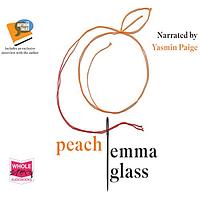Take a photo of a barcode or cover
I've definitely never read anything quite like this...it was an interesting mix of poetry and narrative, which at times lost me but I mostly followed it. I didn't have a solid enough grasp on this book to love it but I definitely found it enticing and confronting. I feel like this book would be a great one to analyse, rather than to enjoy.
Peach has just 98 pages, but is completely unique in its story and writing style. Heavy in visceral symbolism and ambiguous in its prose, the story follows a girl’s stream of consciousness after a harrowing and brutal experience of sexual assault.
The writing style is completely different to anything I’ve read - it reads more like a poem cryptic in its true meaning than your typical novel of psychological fiction. Despite being a short novella, I found it a challenging read due to the graphic and grotesque descriptions as well as the overall form of the book itself. After her assault, Peach aims to continue with her life as normally as she can - her pain and trauma goes unnoticed by her family members and her boyfriend, but she is plagued with jarring and convoluted memories of the assault and her attacker.
What I liked about this book was the clever use of intense and experimental symbolism - the book explores the complexities of the aftermath of tragedy and Peach’s subsequently damaged psyche in an interesting way, making the book definitely memorable and compelling for the reader.
Although the writing style worked well for the stream-of-consciousness-like narrative and the length of the story itself, it wasn’t something I particularly found myself enjoying because of the fact that a lot of it was so surreal and incomprehensible at times. However, it does work well with the concept of it being a work of psychological fiction, as well as the intense topic that is being covered within the story itself.
The story is both unsettling and fascinating, and the expressive imagery and powerful and distressing narrative will definitely stay with you when you’ve finished this book. It’s definitely impactful (especially the ending!) and worth a read if you’re interested in psychological fiction and reading more of a new and interesting writing style.
The writing style is completely different to anything I’ve read - it reads more like a poem cryptic in its true meaning than your typical novel of psychological fiction. Despite being a short novella, I found it a challenging read due to the graphic and grotesque descriptions as well as the overall form of the book itself. After her assault, Peach aims to continue with her life as normally as she can - her pain and trauma goes unnoticed by her family members and her boyfriend, but she is plagued with jarring and convoluted memories of the assault and her attacker.
What I liked about this book was the clever use of intense and experimental symbolism - the book explores the complexities of the aftermath of tragedy and Peach’s subsequently damaged psyche in an interesting way, making the book definitely memorable and compelling for the reader.
Although the writing style worked well for the stream-of-consciousness-like narrative and the length of the story itself, it wasn’t something I particularly found myself enjoying because of the fact that a lot of it was so surreal and incomprehensible at times. However, it does work well with the concept of it being a work of psychological fiction, as well as the intense topic that is being covered within the story itself.
The story is both unsettling and fascinating, and the expressive imagery and powerful and distressing narrative will definitely stay with you when you’ve finished this book. It’s definitely impactful (especially the ending!) and worth a read if you’re interested in psychological fiction and reading more of a new and interesting writing style.
I'm normally a fan of gross books, but this was GROSS, even for me!
Peach tells the story of a teenage (I think?!) girl in the aftermath of sexual assault, but it often tells very little story thanks to its stream-of-consciousness style. This prose poetry style is sometimes really effective and beautiful to read, but often makes the story genuinely difficult to follow. I listened to it as an audiobook, which made the gross stuff truly visceral, kept the story moving, and made the best of words chosen carefully for the way they sound together. I honestly think I would've given up on this had I been reading it, but it was a worthwhile listen.
Peach tells the story of a teenage (I think?!) girl in the aftermath of sexual assault, but it often tells very little story thanks to its stream-of-consciousness style. This prose poetry style is sometimes really effective and beautiful to read, but often makes the story genuinely difficult to follow. I listened to it as an audiobook, which made the gross stuff truly visceral, kept the story moving, and made the best of words chosen carefully for the way they sound together. I honestly think I would've given up on this had I been reading it, but it was a worthwhile listen.
challenging
dark
emotional
medium-paced
Plot or Character Driven:
Character
Strong character development:
Complicated
Loveable characters:
No
Diverse cast of characters:
No
Flaws of characters a main focus:
Yes
dark
tense
fast-paced
Plot or Character Driven:
Plot
Strong character development:
N/A
Loveable characters:
Complicated
Diverse cast of characters:
No
Flaws of characters a main focus:
Complicated
Graphic: Rape, Blood, Vomit
Trigger warning: Abuse, sexual assault, rape, self harm
Emma Glass has a way with words, that's a fact. Her verse is so well polished that I felt every word dripping into my body and soul. The plot of the book felt a tiny bit off just because it it paced so differently than a normal novel. The story is so raw, harsh and honest and I appreciate the fact that Glass does not sugar coat assault, which we all shouldn't. Her raw emotion and feeling behind the words was just so powerful that I couldn't put it down.
Emma Glass has a way with words, that's a fact. Her verse is so well polished that I felt every word dripping into my body and soul. The plot of the book felt a tiny bit off just because it it paced so differently than a normal novel. The story is so raw, harsh and honest and I appreciate the fact that Glass does not sugar coat assault, which we all shouldn't. Her raw emotion and feeling behind the words was just so powerful that I couldn't put it down.
"Grief will be worn like a cloak, will drag along behind me, heavy."
"What happens if you die in a dream?"
3.5/5 stars
"What happens if you die in a dream?"
3.5/5 stars
This was an odd one, less a novel and more of a series of interconnected prose poems. It takes on some very dark subject matter (sexual assault), but the writing style -- florid language, word play, repetition, interior rhymes -- undercuts a lot of what I think the author is trying to say/do.
It wasn't bad, and I'll definitely be keeping on eye out for what the author does next, but this one just didn't connect with me the way in which I was expecting.
It wasn't bad, and I'll definitely be keeping on eye out for what the author does next, but this one just didn't connect with me the way in which I was expecting.
The writing was beautiful in many places with the deployment of alliteration, onomatopoeia and thyme turning it into an almost poetic novella. However, for me, the use of metaphor in many places became jarring and too much - it became hard to grasp what was supposedly happening. In some places it worked but in others it felt redundant and clumsy.
Taking into account how short it is, I’d recommend it for a quick read but be aware that the subject matter is triggering and there are some rather graphic and uncomfortable descriptions.
Taking into account how short it is, I’d recommend it for a quick read but be aware that the subject matter is triggering and there are some rather graphic and uncomfortable descriptions.
With its truly singular approach, this intense, captivating novella explores the physical and psychological fallout of sexual assault like no other fiction I’ve encountered. For those worried about trigger warnings, this is undoubtedly a graphic and upsetting read, but it’s also worth noting that the assault itself takes place off-the-page; the narrative opening with our protagonist stumbling home in the moments afterwards.
Written in short, staccato sentences and regularly employing surreal imagery, the book’s unorthodox, bewildering style seems guaranteed to alienate readers who generally struggle with experimental prose (as I myself often do). The short length helps to counteract this, however; allowing the book to hit home like a swift punch to the gut while also sparing us the strain of suspending our disbelief for too long.
Not only does the writing style encapsulate our narrator’s fragmented, shellshocked mindset – her sheer inability to face the real world in its overwhelming entirety – it also allows the author to play with language and rhythm in a lively, engaging way. In fact, the book often feels like an extended prose poem that would benefit from being read aloud.
Beyond this, the surreal elements serve to make our narrator, in some ways, unreliable. The truth of her attack is never in doubt, but how much of the fever dream that follows is real, and how much is a trauma response reflective of her damaged psyche becomes unclear. As the line between the two becomes increasingly blurred, the feeling of tension and claustrophobia builds, with Glass commenting on the nature of obsession, the price of revenge, and the horror of being consumed in mind and body.
While it’s true of every book that it won’t be for everyone, the sentiment feels particularly true here. But for those able to submit themselves to its wholly original style, Peach is a powerful, visceral experience that simmers with equal parts rage and compassion.
Written in short, staccato sentences and regularly employing surreal imagery, the book’s unorthodox, bewildering style seems guaranteed to alienate readers who generally struggle with experimental prose (as I myself often do). The short length helps to counteract this, however; allowing the book to hit home like a swift punch to the gut while also sparing us the strain of suspending our disbelief for too long.
Not only does the writing style encapsulate our narrator’s fragmented, shellshocked mindset – her sheer inability to face the real world in its overwhelming entirety – it also allows the author to play with language and rhythm in a lively, engaging way. In fact, the book often feels like an extended prose poem that would benefit from being read aloud.
Beyond this, the surreal elements serve to make our narrator, in some ways, unreliable. The truth of her attack is never in doubt, but how much of the fever dream that follows is real, and how much is a trauma response reflective of her damaged psyche becomes unclear. As the line between the two becomes increasingly blurred, the feeling of tension and claustrophobia builds, with Glass commenting on the nature of obsession, the price of revenge, and the horror of being consumed in mind and body.
While it’s true of every book that it won’t be for everyone, the sentiment feels particularly true here. But for those able to submit themselves to its wholly original style, Peach is a powerful, visceral experience that simmers with equal parts rage and compassion.




